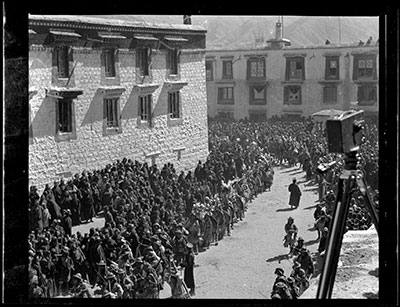
2001.59.1.22.1 (Film negative)


2001.59.1.22.1 (Film negative)

Hugh E. Richardson
Hugh Richardson
March 6th 1937
Lhasa > Jokhang (south west corner from Doring house)
2001.59.1.22.1
54 x 43 mm
Performing , Ritual Activity
Negative film nitrate
Donated August 2001
The executors of the estate of Hugh E. Richardson
Hugh E. Richardson
Manual Catalogues - Notes on negative album - '1' 'Chipsha: Dzonggyab [rdzong rgyab]: Torgyap [gtor rgyag] ----- [illegible]' is written in white in Richardson's hand. Notes inside negative album: white label with Richardson's name and address in St. Andrews. [KC 8/7/2006]
Manual Catalogues - Notes on negative index - Folio 22. 'RKANG DMAG'. [KC 17/7/2006]
Manual Catalogues - Richardson's hand list: Negative album No.1 'New Year Ceremonies at Lhasa'. The Smon-lam gtor-rgyag Ceremony on 24th of 1st month for driving out evil. No. 22-4. 'The rkang-dmag , foot soldiery, known as Gzimg sbyong-nga , arrive led by the city magistrates, mi-dpon . The soldiers wear old armour and carry wicker shields, Tibetan-made muskets and some have bows and arrows and quivers.' [KC 17/7/2006]
Technical Information - This image seems to have been taken with a Zeiss Super Ikonta C camera. This was a 6x9 format camera but came with a film plane mask that enabled 6x4.5 images to be taken. This enabled 16 images to be taken on a roll of 120 film as opposed to 8 without the mask [MS 6/10/2005]
Other Information - Background: See Hugh E. Richardson, Ceremonies of the Lhasa Year , 1993, London: Serindia Publications, pp 39-49 for a description of the Monlam Torgya ( mon lam gtor rgyag) ceremony. "The ceremony of Monlam Torgya is the longest and the most spectacular event of the New Year celebrations. It is the high point of the Yaso's tenure of office and the day for which the Tsisher was the preparation. It brings together religious and secular elements and marks the formal end of the Monlam Chenmo. On this occasion they are joined by a band of foot soldiers called Zimchongpa. The orthography and even the meaning of the name are obscure. Nominally they number five hundred ... . They have specific duties throughout the year such as carrying banners in processions and pitching the Dalai Lama's Mongolian tent which is taken when he travels. For the Torgya ("Casting Out the Votive Offering") they are reinforced by others who are paid for the day. They are organised into two wings with the Mongol names of Julag and Shamngso and are supposed to be descendants of Gushri Khan's infantry. They weaar chain-mail, which is in very good condition compared with that of most of the cavalry, steel helmets with large plumes or a pair of flags like the headress of some oracle priests; and they are variously armed with matchlocks. swords, bows and arrows; some carry large round shields of strongly made wickerwork; others have copper trumpets." (p.39) [KC 17/7/2006]
Other Information - Dates: In a letter to his parents dated November 6th 1936, Hugh Richardson commented that he was investigating buying a new Zeiss Super Ikonta camera [Hugh Richardson Manuscript Archive, Bodleian Library, MS. Or. Richardson 3 folio 46]. On March 29th 1937 he comments in a further letter to his parents that it would probaby be better to use the larger image frame [MS Or Richardson 3 folio 82]. This has assisted the dating of this image to 1937 [MS 6/10/2005]
For Citation use:
The Tibet Album.
"Procession of Zingchongpa on Barkhor at Monlam Torgya"
05 Dec. 2006. The Pitt Rivers Museum.
<http://tibet.prm.ox.ac.uk/photo_2001.59.1.22.1.html>.
For more information about photographic usage or to order prints, please visit the The Pitt Rivers Museum.
© The Pitt Rivers Museum